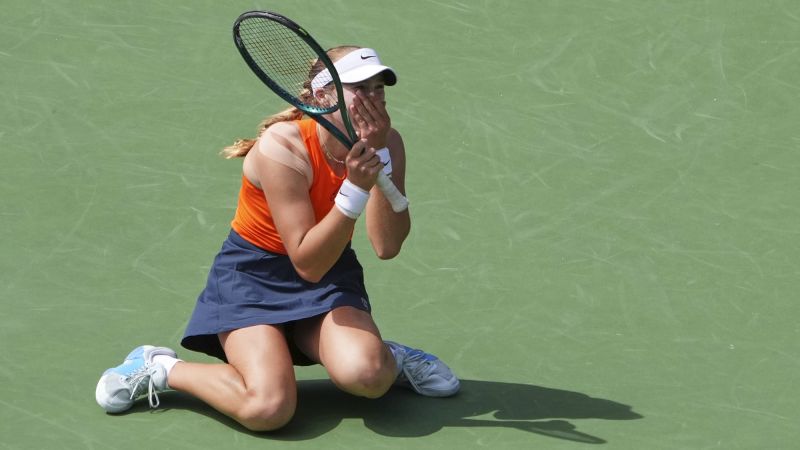Mirra Andreeva, a 17-year-old sensation, has claimed her second consecutive WTA 1000 title by defeating World No. 1 Aryna Sabalenka in a three-set final at the BNP Paribas Open. The young player showcased incredible resilience, coming back from a set down to secure the victory 2-6, 6-4, 6-3.
This win marks Andreeva’s 12th straight match victory, continuing her momentum from her previous WTA 1000 title at the Dubai Duty Free Tennis Championships last month. She is now the youngest player since 2009 to achieve such a winning streak at the WTA 1000 level.
Andreeva, who entered the tournament ranked No. 11, has made history as the youngest player in 40 years to defeat both World No. 1 and No. 2 at a single WTA event. Prior to this victory, she overcame two-time champion and No. 2 Iga Swiatek in the semifinals, marking her second win against Swiatek in recent tournaments.
Indian Wells is Andreeva’s third career title and her second this season. Impressively, two of these titles are at the prestigious WTA 1000 level. Her remarkable performance will propel her to a career-high ranking of No. 6 in the PIF WTA Rankings on Monday. She now leads the tour in wins this season with a total of 19.
‘I want to thank myself again for fighting until the very end, for believing in myself, and for never giving up,’ Andreeva expressed in her on-court speech, quoting rapper Snoop Dogg.
‘I felt like I was running like a rabbit out there today. It was so difficult to keep up, so I just gave it my all. That’s why I want to thank myself, because I think I played a significant part in this victory.’
Andreeva is now the third youngest champion at Indian Wells, following in the footsteps of tennis legends Martina Hingis (1998) and Serena Williams (1999). Her path to the title was exceptionally challenging, including wins against Varvara Gracheva, 22nd seed Clara Tauson (a rematch of the Dubai final), 7th seed Elena Rybakina, and 23rd seed Elina Svitolina, in addition to her victories over the top two ranked players.
Andreeva entered her first Indian Wells final seeking her first hard-court win against Sabalenka, who had previously won all four of their hard-court matches, including two earlier this year in Brisbane and at the Australian Open.
Sabalenka, the 2023 finalist, quickly took the first set in just 36 minutes. Andreeva had an early opportunity to gain control, earning a break point in the third game, but Sabalenka skillfully saved it with a volley at the net.
After escaping Andreeva’s initial pressure, Sabalenka dominated, breaking Andreeva’s serve in the following game and conceding only one more game to secure the first set.
However, Andreeva turned the tide in the second set. Having been unsuccessful in 18 previous break point opportunities against Sabalenka this season, she finally broke through with a strong return game, culminating in a forehand winner to take a 2-1 lead. Maintaining her composure under pressure, Andreeva saved two break points from a 0-30 deficit to extend her lead to 4-2. She then clinched the set with a dominant service game, including consecutive aces, marking her first set win against Sabalenka on hard courts.
‘In the second set, I focused on playing more aggressively,’ Andreeva explained. ‘I didn’t try to overpower her, as I don’t think anyone can outpower Aryna, given her incredible strength.’
‘My strategy was to create discomfort for her, and gradually, point by point and game by game, I managed to execute that.’
Andreeva’s momentum continued into the third set, where she won eight consecutive points, breaking Sabalenka at love to take a 1-0 lead. Although Sabalenka briefly threatened a comeback by breaking back to 1-1, Andreeva immediately responded with another break and consolidated it to lead 3-1. She maintained her advantage to the end, securing her first career victory over a reigning World No. 1.
‘Honestly, it felt like it was me against myself out there,’ Sabalenka admitted. ‘I made too many unforced errors at crucial moments and allowed her to elevate her game. Initially, everything was going smoothly, but then I made a couple of mistakes, and she gained confidence. After that, my game deteriorated, and I struggled to regain my rhythm.’
Andreeva’s victory makes her the youngest player to defeat a World No. 1 in a completed match since 2008 and the youngest to achieve this in a WTA final since Maria Sharapova’s win against Lindsay Davenport at the 2005 Tokyo event. She is also the youngest player to win back-to-back WTA 1000 or Tier 1 tournaments since Martina Hingis in 1997.
The tennis tour now shifts its attention to the Miami Open, the fourth WTA 1000 tournament of the season, commencing on Tuesday, March 18, at Hard Rock Stadium.

